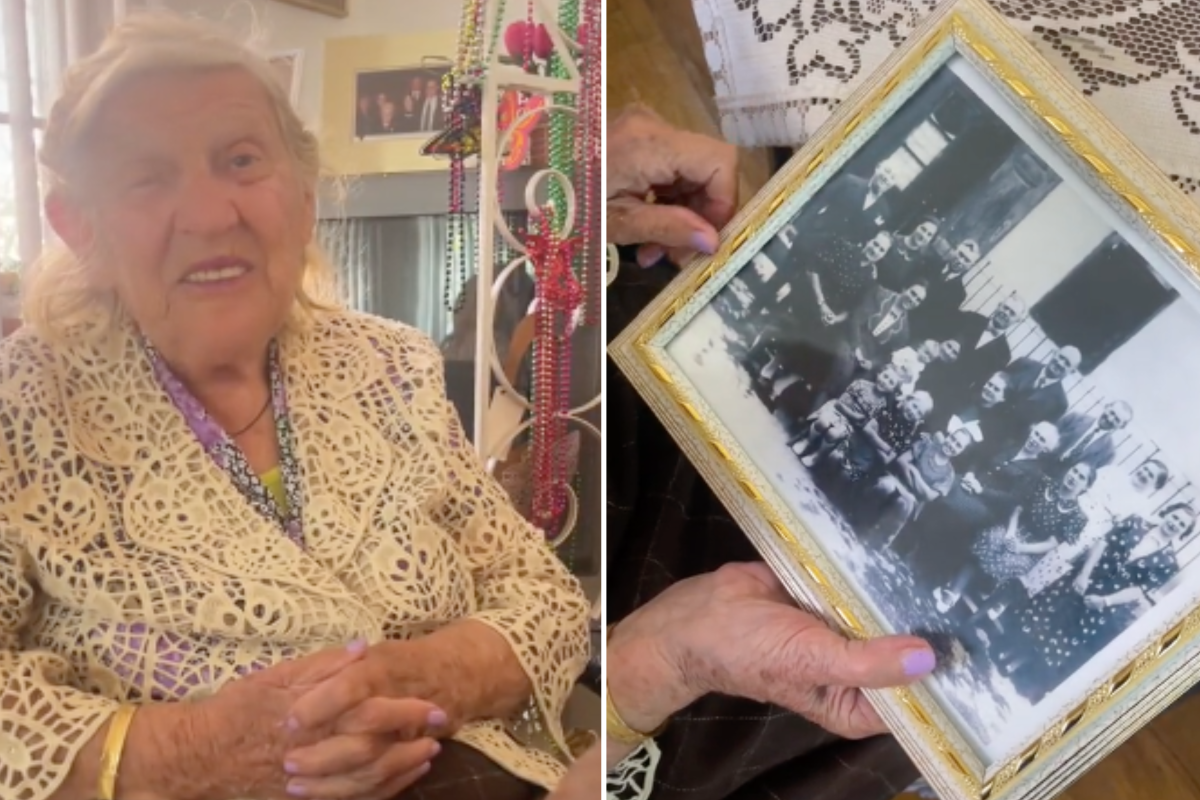A New York woman went viral on TikTok after sharing a powerful video of her visit with a Holocaust survivor on the platform
Posted on TikTok on Wednesday, the video of Aija Mayrock taking Shabbat dinner to a 92-year-old named Zahava reached over 570,000 views and hundreds of comments.
Mayrock, who is from Brooklyn, New York, has been volunteering to help Holocaust survivors for two years, she told Newsweek. Volunteers like Mayrock give their time to provide the seniors with kosher meals, and perhaps equally importantly, company.
"I bring Shabbat dinner to Holocaust survivors, many of whom live below the poverty line and are often food insecure," Mayrock told Newsweek. "I have developed friendships with some of the people I visit and provide emotional and social support, particularly as many were alone and homebound during the pandemic."

It is estimated that over 67,000 Holocaust survivors reside in the United States, and around a third of them live in poverty. By 2030, 13 percent of all U.S. Holocaust survivors are projected to be both poor and severely disabled, according to data in the report "Nazi Victims of the Holocaust Residing in the United States: Estimates &
Projections: 2010-2030."
Mayrock says in her TikTok video that when Zahava was just 14 years old, she and her entire family were taken to Auschwitz.
Auschwitz, located in Poland, was the largest of the Nazi concentration camps. Over 1.1 million men, women, and children were killed there between 1940 and 1945.
In the video, Zahava shows the camera a video of her family posing together and smiling. Mayrock said that of the 18 people in the photo, every person was killed except for Zahava and her sister, who are sitting in the front row.
The two young girls were put to work, and in 1945 were taken on a death march.
Death marches were huge, forced transfers of prisoners from one Nazi camp to another, involving prisoners walking long distances without food. Those who lagged behind or fell were shot and killed. The largest death march took place in January 1945, just nine days before the Soviet army arrived at Auschwitz.
Some 56,000 prisoners were marched to the train station 35 miles away where they were to be transported to other camps. Over 15,000 people died during the journey.
Shortly after this, Zahava and her fellow prisoners were liberated by Soviet troops and were able to go back to their home in Hungary. When the sisters returned home, they found out that their family dead, and were faced with Nazis living in their house.
"Zahava asked me to share her story so that everyone would know what they did to her family," Mayrock said in her TikTok video.
"I have been doing this work for the last few years, but I never posted about it," Mayrock said. "Only a few friends and family knew that I was doing it. Many of the survivors I visit want to share their stories desperately and seek an outlet for that. Many still do speaking events, have written books, or do interviews. I began sharing those stories a few months ago. I never anticipated the response it has gotten."
The overwhelming reaction online has blown Mayrock away. Many TikTok users asked for an address to send letters. Since it was provided, she has received boxes upon boxes of letters to survivors from all over the country.
"I am so glad that these unbelievably resilient, incredible people are able to have their stories heard, particularly by young people who so often don't know anything about the Holocaust," said Mayrock: "Many of my friends, some of which went Ivy League institutions, know nothing about the Holocaust. There is so much work to be done."
After the Holocaust, Zahava moved to New York City, became a librarian, and started a family with her husband. She's now a grandmother, as well.
When asked how she survived, Zahava told Mayrock: "You don't survive, but you find a way to live."
Uncommon Knowledge
Newsweek is committed to challenging conventional wisdom and finding connections in the search for common ground.
Newsweek is committed to challenging conventional wisdom and finding connections in the search for common ground.
About the writer
Alice Gibbs is a Newsweek Senior Internet Trends & Culture Reporter based in the U.K. For the last two years ... Read more
To read how Newsweek uses AI as a newsroom tool, Click here.








